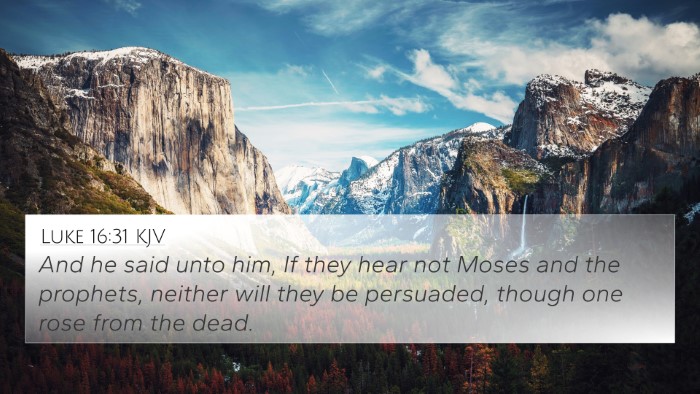Understanding John 12:37
Verse: John 12:37 - "But although He had done so many signs before them, they did not believe in Him."
Summary: This verse reflects on the profound tragedy of unbelief despite the clear evidence of Jesus' divine nature and messianic authority demonstrated through His miracles.
Commentary Insights
The following insights are compiled from the works of Matthew Henry, Albert Barnes, and Adam Clarke:
Matthew Henry's Commentary
Henry emphasizes the hard-heartedness of the people despite the numerous signs and wonders performed by Jesus. He points out that the miracles were not only a display of divine power but also an invitation to faith. The resistance to belief indicates a spiritual blindness, revealing a serious condition of the human heart.
Albert Barnes’ Notes
Barnes notes that the miracles performed by Jesus were undeniable proofs of His divine mission. However, the refusal to believe in Jesus despite these manifestations illustrates a deeper issue of rejection of truth. He highlights the fulfillment of Isaiah's prophecy regarding disbelief, drawing a connection between human stubbornness and prophetic scripture.
Adam Clarke's Commentary
Clarke discusses the significance of faith and the consequences of skepticism. He conveys the notion that witnessing miracles does not guarantee belief, suggesting that faith is a gift rather than merely a product of observation. The verse serves as a sobering reminder of the need for an open heart to receive spiritual truths.
Cross-References
This verse connects to several others in the Bible that illustrate themes of belief and unbelief:
- Isaiah 53:1 - "Who has believed our report? And to whom has the arm of the LORD been revealed?"
- Matthew 13:58 - "Now He did not do many mighty works there because of their unbelief."
- John 6:36 - "But I said to you that you have seen Me and yet do not believe."
- John 10:37-38 - "If I do not do the works of My Father, do not believe Me; but if I do, though you do not believe Me, believe the works..."
- Romans 10:16 - "But they have not all obeyed the gospel. For Isaiah says, 'Lord, who has believed our report?'"
- Hebrews 3:19 - "So we see that they could not enter in because of unbelief."
- 2 Corinthians 4:4 - "Whose minds the god of this age has blinded, who do not believe..."
Thematic Connections
This verse serves as a pivotal point for understanding the interactions between divine signs and human belief. The theme of unbelief is intricately woven throughout the Scriptures, presenting a rich tapestry of analysis:
- Miraculous Signs versus Faith: The miracles that Jesus performed were significant acts meant to evoke faith, yet many remained skeptical.
- Prophecy and Fulfillment: The reference to Isaiah points to the prophetic declarations concerning the Messiah, showing how Jesus fulfilled these prophecies amidst resistance.
- Human Condition: This verse highlights a crucial aspect of human nature, where cognitive dissonance leads people to reject evident truths, represented by the miracles of Jesus.
Scriptural Cross-Referencing
To dive deeper into understanding this verse, utilizing tools for Bible cross-referencing can enhance one's study. Here are some suggestions:
- Bible Concordance: A concordance can help you find and link various Bible verses that discuss related themes.
- Bible Cross-Reference Guide: These guides provide an organized way to study themes through interrelated scriptures.
- Cross-Reference Bible Study: Engaging in group or personal Bible studies that focus on cross-referencing can yield deeper insights into scripture.
- Comprehensive Bible Cross-Reference Materials: Use resources that offer detailed connections between verses to enhance theological understanding.
Conclusion
John 12:37 is not just a statement about skepticism; it is a profound reflection on humanity's relationship with truth and divine revelation. By examining the connections between this verse and others, believers can gain a better understanding of their faith and the Gospel's implications. The journey through scripture, enhanced by thorough cross-referencing and thematic exploration, can lead to deeper spiritual insights and a more robust faith.
As you explore this verse, consider not only its meaning but also how it fits into the overarching narrative of scripture, inviting you to engage with the message of Christ and the call to belief in His works.







